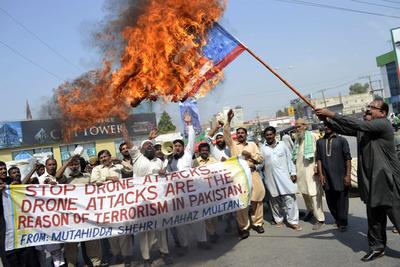which according to the survey was supported by 24 per cent of voters, while the ruling Pakistan People’s Party (PPP) had the support of 14 per cent of the population.
Though no survey can claim to be perfect, the findings are interesting. Until recently Imran Khan’s PTI was the most popular choice for the people of Pakistan. A survey in May showed 31 per cent of people were in favour of PTI, followed by 28 per cent for the PML-N and 16 per cent for the PPP. Significantly, in the PML-N bastion of Punjab, the popularity of PTI has taken a beating: a survey conducted by IRI in February showed that PTI had the support of 33 per cent of those polled in Punjab. In the September 2012 IRI survey this had fallen to 27 per cent, while PML-N’s numbers had gone up from 41 per cent to 43 per cent.
The findings could change once again with Imran Khan’s recent anti-US-drone march to South Waziristan especially now that anti-US sentiment in Pakistan is on the rise. Other opposition parties including PML-N have criticised US drone strikes, but not as vociferously as Khan.
There are several possible reasons for the changes in polling since the May survey. First, it is argued that the Pakistani voter would prefer to go with a tried and tested leader like Sharif, who has already served twice as prime minister. Besides, some of Sharif’s achievements during his second term as Prime Minister, such as the Lahore-Islamabad motorway and the initiation of the Gwadar port reiterate his progressive vision, especially amongst those yearning for development projects. Like Sharif, Imran Khan is conservative when it comes to religious issues, but he has a left-of-centre tilt on economic issues and has not been able to articulate his economic policies clearly. This is especially so in Punjab, where the PML-N receives substantial support from the business community of the province which is supportive of Sharif’s pro-business orientations.
Second, Sharif’s popularity is no longer restricted to Punjab; he has managed to gain some ground in other provinces such as Khyber Pakhtunkhwa. In the aftermath of Benazir Bhutto’s assassination Sharif is the only national leader in Pakistan. He has also taken on the army on several issues, and, despite policy disagreements with the current PPP regime, he has not tried to destabilise the government, which will be the first democratic administration to complete its tenure.
Third, while the PPP believes PTI will cut into PML-N votes, there is a strong possibility that PTI will make a dent in PPP votes instead.
If the IRI survey translates into electoral votes for Sharif’s PML-N, what kind of foreign policy would he be likely to follow? Pakistan’s current India policy is likely to continue unchanged: in earlier tenures Sharif made earnest attempts to establish peace with India, though they were scuttled by the Kargil Aggression in 1999. While in opposition he backed the PPP’s peace initiatives toward India, and has repeatedly stated that trade with India — and not foreign aid — is the only way out of the current mess. Similarly, Sharif has advocated a liberal visa regime, recommending visa on arrival for Indian citizens,despite scathing criticism from conservative media. Pursuing friendship with India is important from Sharif’s perspective because the economic benefits from bilateral trade are undeniable, and because improved India–Pakistan relations will help Sharif to further tighten the screws on the Army–Inter-Services Intelligence combine, something he has wanted to do since he was ousted in the 1999 coup.
The other important question relates to how Sharif might handle the Islamabad–Washington relationship. The 63-year-old conservative may not seem to be one to do business with the Americans, but he is actually their best bet. Sharif is showing he is a nationalist and will not take direction from Washington — as evidenced by his support of Pakistan going nuclear. Yet he is not totally irrational either. For example, former US Deputy Secretary of State, Strobe Talbott, in his book Engaging India, Diplomacy, Democracy and the Bomb has attested to the fact that Sharif opted for nuclear proliferation in 1998 only after being left with no other option, due to India’s own nuclear tests. Many in the US have begun to realise that dealing with Sharif may be tough certainly not impossible, and his popularity across the board may be his biggest asset.
It is imperative that the United States — which has lost patience with Pakistan, but not necessarily with the civilian government — realises the advantages of dealing with a ‘Made in Pakistan’ national politician, who may not be liberal in their terms, but is surely acceptable given his political pragmatism which is evident from his pro-business policies and desire for better relations with India.
Tridivesh Singh Maini is a columnist and independent foreign policy analyst based in New Delhi.

